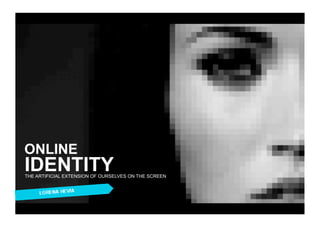
The Life on the Screen (online identity)
- 1. ONLINE IDENTITY THE ARTIFICIAL EXTENSION OF OURSELVES ON THE SCREEN
- 2. ONLINE IDENTITY THE ARTIFICIAL EXTENSION OF OURSELVES ON THE SCREEN SHERRY TURKLE POSTMODERNISM AND THE CULTURE OF SIMULATION MUD ONLINE IDENTITY ROMANTIC MACHINES?
- 3. SHERRY TURKLE BIOGRAPHY 1948. Born in NY, U.S 1969. Politics studies, Paris 1973. M.A Sociology, Harvard, U.S 1976. PhD. Sociology and Personality Psychology. 1976_present. Professor MIT Social studies and human- technology interaction. THE LIFE ON THE SCREEN
- 4. INTRODUCTION COMPUTERS AND CYBERSPACE _COMPUTER A TOOL AND A MIRROR develop and tasks and project ourselves _ CYBERSPACE IMMATERIAL MEDIUM THAT EXISTS BETWEEN THE REAL AND THE UNREAL _ VIRTUAL PLACE allow people + move to different places (immaterial) + human interactions + construct identities and different roles + build communities (share ideas and interests)
- 5. POSTMODERNISM _ POSTMODERNIST VIEW AND NEW TECHNOLOGIES CHANGED THE UNDERSTANDING OF HUMAN IDENTITY + Instable + Relative + Decentred + Plural + Contradictory + Aesthetic
- 6. THE CULTURE OF SIMULATION POSTMODERNISM VIEW AND SIMULATED SPACES COMPUTERS AND NEW TECHNOLOGIES EMBODY POSTMODERNIST THEORIES _ FROM THE CULTURE OF CALCULATION TOWARD THE CULTURE OF SIMULATION The culture of simulation is affecting the way that people understand their mind and body _ NEW RELATIONSHIPS MIND / BODY / SELF / MACHINE
- 7. THE CULTURE OF SIMULATION _ SIMULATED ENVIRONMENTS between the real and the artificial creation of artificial worlds and virtual relationships _ THE USE OF TECHNOLOGY IN SIMULATED ENVIRONMENTS HUMAN EXTENSION
- 8. THE CULTURE OF SIMULATION SIMULATED WORLDS “THIS IS MORE REAL THAN THE REAL LIFE” GRAPHIC / AESTHETIC WORLD _ SIMULATED REALITY immaterial and visual world _ REINVENTION OF IDENTITY new medias and online participation allow people to redefine ourselves _ COMPUTER GAMES ROLE-PLAYING GAMES example of culture of simulation
- 9. MUD MULTI-PLAYER-DOMAINS / DUNGEOS MULTI-PLAYER-DOMAINS / “DUNGEOS AND DRAGONS” _ APPLICATION OF POSTMODERNISM BETWEEN THE REAL AND THE UNREAL Interaction between real people + robots
- 10. MUD MULTI-PLAYER-DOMAINS / DUNGEOS MULTI-PLAYER-DOMAINS “DUNGEOS AND DRAGONS” Developed by Gary Gygax, 1974 _ TEXT-BASED COMPUTER GAME ROLE-PLAYING GAME Simulation of fantastic worlds and magic characters e.g. The Lord of the Rings (Tolkien) + Internet / textual description + Online community + Simultaneous interaction (play with other at real time) WHAT IS THE GAME ABOUT? DIFFERENT KINDS OF WAR _ world war _ civic war _ revolution _ battles and combats
- 11. MUD MULTI-PLAYER-DOMAINS / DUNGEOS “people express and explore unexplored aspects of themselves playing with their identities” Sherry Turkle, 1995 _ COMPUTER SCREEN PEOPLE PROJECTION ANONYMOUS INTERACTION you are who you pretend to be _ CREATION OF IDENTITY + Creation of characters + Physical attributes + Psychological attributes
- 12. ONLINE IDENTITY THINKING ABOUT IDENTITY HUMAN IDENTITY WITHIN TECHNOLOGICAL SPACES + Technology changes people's mind and human perceptions (reality) + Immaterial space of interactions + Space where people can feel more comfortable (use anonymity) COMPUTER SCREEN AND IDENTITY the space of human fantasies where we project our-selves
- 13. ONLINE IDENTITY THINKING ABOUT IDENTITY AVATAR: DIGITAL IDENTITY SELF- REPRESENTATION IN ROLE-PLAYING GAMES _ ONLINE, PLAYERS CAN + Edit their self-presentation + Perform an identity different to the real self + Choose a role that make them feel comfortable + Play different identities _ IDENTITY CUSTOMIZATION Digital attributes: embodiment + Dreams + Emotions + Fears
- 14. ONLINE IDENTITY THINKING ABOUT IDENTITY AVATAR: DIGITAL IDENTITY SELF- REPRESENTATION IN ROLE-PLAYING GAMES _ MULTIPLE AVATARS _ MULTIPLE ROLES _ MULTIPLE IDENTITIES
- 15. ONLINEFOR CHILE A ROOF IDENTITY THINKING ABOUT IDENTITY ABOUT ITS HISTORY SELF- REPRESENTATION IN ROLE-PLAYING GAMES MULTIPLE AVATARS + MULTIPLE ROLES = MULTIPLE IDENTITIES
- 16. ONLINEFOR CHILE A ROOF IDENTITY THINKING ABOUT IDENTITY ABOUT ITS HISTORY SELF- REPRESENTATION IN ROLE-PLAYING GAMES MULTINATIONAL COMPANIES AND SOCIAL EVENTS
- 17. ROMANTIC MACHINES? _ PROXIMITY PEOPLE / TECHNOLOGY Computers have become closer to people and people have become closer to computers _ COEXISTANCE People IS coexisting with machines psychological / physiological effects MACHINES CAN THINK? ARE MACHINES ALIVE?
- 18. ROMANTIC MACHINES? ARE PEOPLE LIKE MACHINES? _ GENETIC REENGINEERING Deciphering a code (DNA) _ THE HUMAN GENOME PROJECT allow to identify DNA and the role in of each gene _ DNA: RESPONSIBLE OF PERSONALITY Temperament Physical appearance Sexual orientation HUMAN BEINGS ARE MACHINES? IS IT POSSIBLE TO REPROGRAM AN HUMAN BEING?
- 19. ONLINE IDENTITY THE ARTIFICIAL EXTENSION OF OURSELVES ON THE SCREEN Turkle, S. 2005. The second self: computers and the human spirit. Cambridge: MIT Press. Turkle, S. 2004. Wither psicoanálisis in computer culture. In Kaplan D. Reading in the philosopy of technology. 2004. Lanham: Romwman & Littlefield Publishers. Turkle, S. 2001. Who am we. In Trend, D. Reading digital cultures. 2001. Massachussets: Blackwell Publisher Ltd. Turkle, S. 1995. Life on the screen: identity in the age of the Internet. New York: Touchstone. Waggoner, Z. 2009. My avatar, my self: identity in video role-playing games. Jefferson: McFarland. Winder, D. 2008. Being virtual: who you really are online. London: John Willey & Sons Ltd.
- 20. ONLINE IDENTITY THE ARTIFICIAL EXTENSION OF OURSELVES ON THE SCREEN HAVE YOU EVER PLAYED ROLE-PLAYING GAMES? HOW MANY VERSIONS OF “YOURSELF” HAVE YOU GOT ONLINE? WHO YOU ARE ONLINE?
